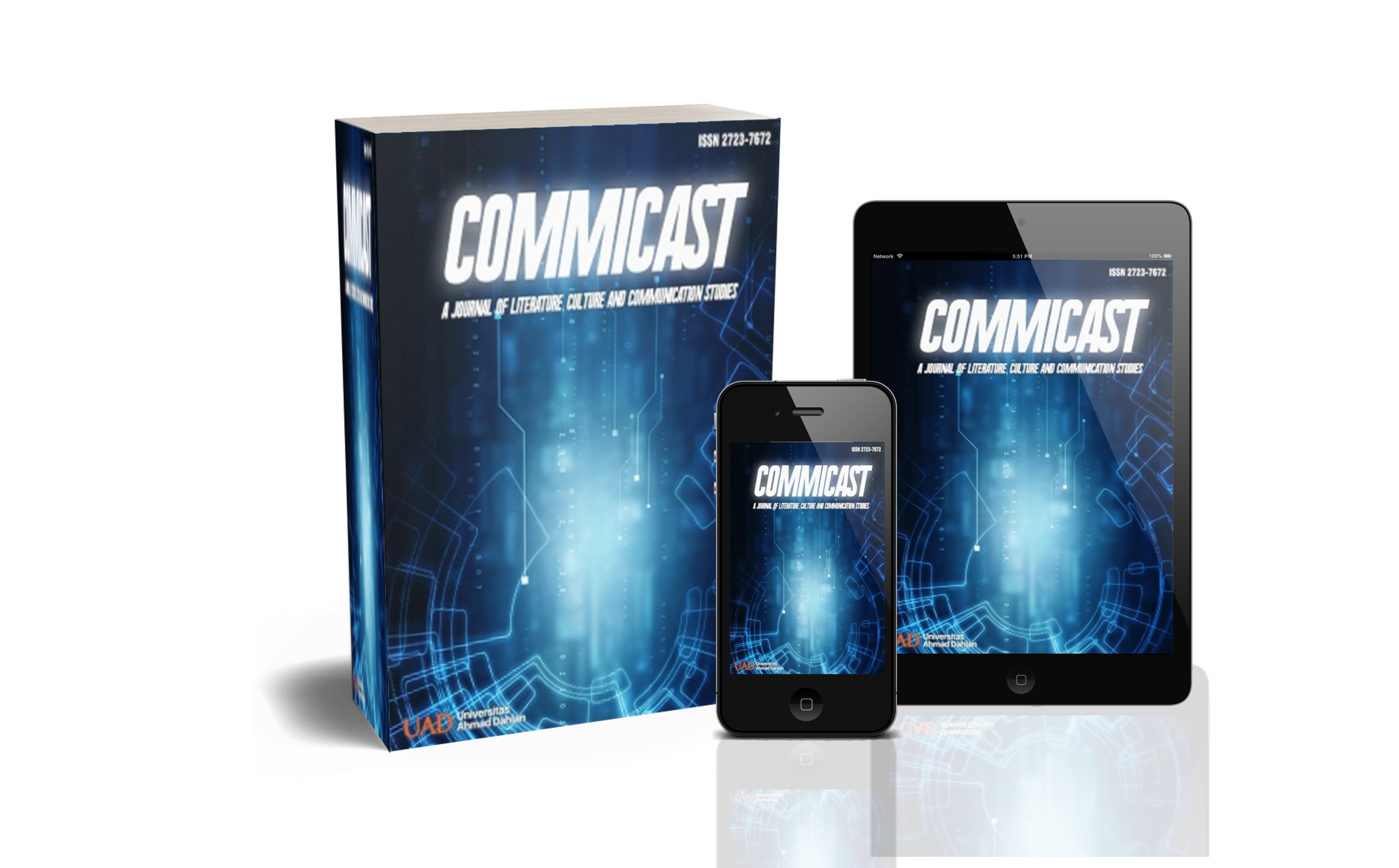Komunikasi efektif komunitas rumah baca dalam meningkatkan minat baca pada anak-anak di dusun Kanoman
DOI:
https://doi.org/10.12928/commicast.v1i1.2408Abstract
Penelitian ini dilakukan dengan dilatar belakangi bahwa minat baca anak-anak di Dusun Kanoman masih rendah. Keberadaan Komunitas Rumah Baca (RBK) sendiri juga di katakan belum berjalan secara efektif. Hal ini dikarenakan Komunitas Rumah Baca (RBK) belum lama berpindah di Dusun Kanoman, volunter yang over load pekerjaan, dan sebagian besar tidak bisa berbahasa Jawa. Tujuan dari penelitian ini adalah untuk mengetahui bagaimana komunikasi efektif  Komunitas Rumah Baca (RBK) dalam meningkatkan minat baca pada anak-anak di Dusun Kanoman.
Jenis penelitian ini menggunakan metode penelitian kualitatif. Teknik pengumpulan data didapatkan dari hasil wawancara, observasi, dan dokumentasi. Teknik analisis data yang digunakan dalam penelitian ini ialah menggunakan model analisis interaktif Miles dan Huberman dengan pendekatan deskriptif analisis.
Hasil penelitian menunjukkan bahwa Komunitas Rumah Baca (RBK) dikatakan mampu meningkatkan minat baca anak-anak di Dusun Kanoman. Hal ini terbukti bahwa anak-anak mulai berkeinginan untuk membaca dan meminjam buku di komunitas. Komunitas juga menerapkan prisip komunikasi efektif yang disingkat REACH. Ada hambatan yang dialami dari pihak komunitas maupun anak-anak, namun hambatan itu dapat diatasi.
References
[2] E. R. Schotter, A. Pollatsek, and K. Rayner, “Reading,†in The Curated Reference Collection in Neuroscience and Biobehavioral Psychology, 2016.
[3] A. M. Muniz and T. C. O’Guinn, “Brand Community,†J. Consum. Res., 2001, doi: 10.1086/319618.
[4] L. Thayer, “Communication,†in Evolution-Revolution: Patterns of Development in Nature Society, Man and Knowledge, 2019.
[5] C. Communication, Handbook of Risk. 2012.
[6] A. J. Underwood, “Community,†in Encyclopedia of Ecology, 2018.
[7] Sugiyono and Republik Indonesia, Metode Penelitian Kuantitatif & kualitatif. 2010.
[8] I. Agusta, “Teknik Pengumpulan dan Analisis Data Kualitatif,†J. Stud. Komun. dan Media, 2014.
Downloads
Published
How to Cite
Issue
Section
License
Copyright (c) 2020 Aniendhita Paramitha

This work is licensed under a Creative Commons Attribution-ShareAlike 4.0 International License.
License and Copyright Agreement
In submitting the manuscript to the journal, the authors certify that:
- They are authorized by their co-authors to enter into these arrangements.
- The work described has not been formally published before, except in the form of an abstract or as part of a published lecture, review, thesis, or overlay journal. Please also carefully read Commicast's Posting Your Article Policy at http://journal2.uad.ac.id/index.php/commicast/about/editorialPolicies#custom-5
- That it is not under consideration for publication elsewhere,
- That its publication has been approved by all the author(s) and by the responsible authorities – tacitly or explicitly – of the institutes where the work has been carried out.
- They secure the right to reproduce any material that has already been published or copyrighted elsewhere.
- They agree to the following license and copyright agreement.
Copyright
Authors who publish with Commicast agree to the following terms:
- Authors retain copyright and grant the journal right of first publication with the work simultaneously licensed under a Creative Commons Attribution License (CC BY-SA 4.0) that allows others to share the work with an acknowledgment of the work's authorship and initial publication in this journal.Â
- Authors are able to enter into separate, additional contractual arrangements for the non-exclusive distribution of the journal's published version of the work (e.g., post it to an institutional repository or publish it in a book), with an acknowledgment of its initial publication in this journal.
- Authors are permitted and encouraged to post their work online (e.g., in institutional repositories or on their website) prior to and during the submission process, as it can lead to productive exchanges, as well as earlier and greater citation of published work.
Licensing for Data Publication
Commicast use a variety of waivers and licenses, that are specifically designed for and appropriate for the treatment of data:
Open Data Commons Attribution License, http://www.opendatacommons.org/licenses/by/1.0/ (default)
Creative Commons CC-Zero Waiver, http://creativecommons.org/publicdomain/zero/1.0/
Open Data Commons Public Domain Dedication and Licence, http://www.opendatacommons.org/licenses/pddl/1-0/
Other data publishing licenses may be allowed as exceptions (subject to approval by the editor on a case-by-case basis) and should be justified with a written statement from the author, which will be published with the article.
Open Data and Software Publishing and Sharing
The journal strives to maximize the replicability of the research published in it. Authors are thus required to share all data, code or protocols underlying the research reported in their articles. Exceptions are permitted but have to be justified in a written public statement accompanying the article.
Datasets and software should be deposited and permanently archived inappropriate, trusted, general, or domain-specific repositories (please consult http://service.re3data.org and/or software repositories such as GitHub, GitLab, Bioinformatics.org, or equivalent). The associated persistent identifiers (e.g. DOI, or others) of the dataset(s) must be included in the data or software resources section of the article. Reference(s) to datasets and software should also be included in the reference list of the article with DOIs (where available). Where no domain-specific data repository exists, authors should deposit their datasets in a general repository such as ZENODO, Dryad, Dataverse, or others.
Small data may also be published as data files or packages supplementary to a research article, however, the authors should prefer in all cases a deposition in data repositories.























